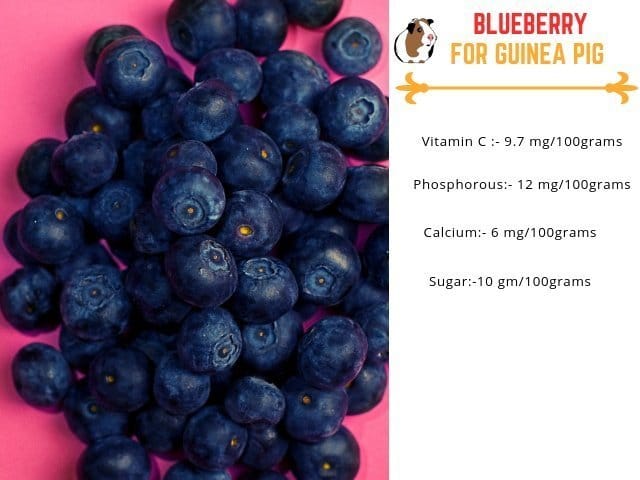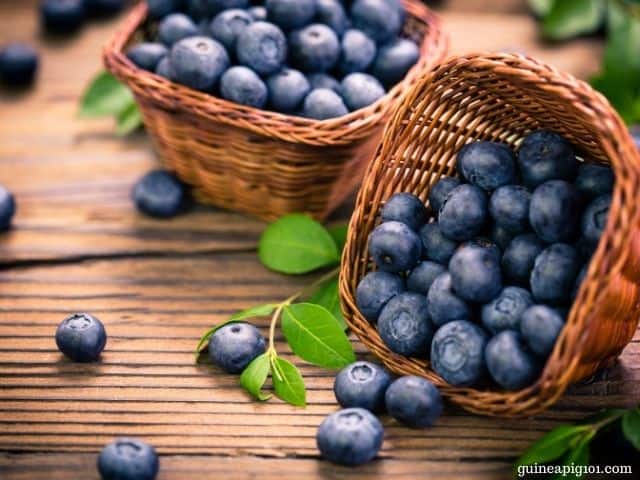Blueberries are those colorful small super fruits packed with antioxidants and vitamins which only a few people can resist. I often have wondered, Can my guinea pigs eat blueberries? So let’s get into it.
Guinea pigs can eat blueberries. Blueberries contain antioxidants and vitamins, which makes them an excellent choice for your guinea pig. But at the same time, blueberries are acidic and contain a lot of sugar, due to which we can serve them in a tiny quantity.
Although guinea pigs can eat blueberries, it is not suitable for all guinea pigs. Some guinea pigs are prone to mouth sores more often than others, so we need to first test the food by serving a small quantity and gradually increasing it if it suits your guinea pig’s taste.
We should dependably remember that the necessary piece of guinea pig’s diet is hay. It is something you should encourage them more often than not. Vegetables and fruits are regularly the best way to enhance their eating regimen with Vitamins and minerals required by their body.
Nutrition in Blueberries?

| Nutrients | Approx Value |
| Vitamin C | 9.7 mg/ 100 g |
| Vitamin A | 54 IU |
| Vitamin K | 19.3 ug / 100 g |
| Calcium | 6 mg/ 100 g |
| Phosphorous | 12 mg/ 100 g |
| Potassium | 77 mg/ 100 g |
| Fiber | 2.4 g/ 100 g |
| Sugar | 10 g/ 100 g |
| Protein | 0.74 g/ 100 g |
| Carbs | 14.49 g/ 100 g |
| Calories | 57 Kcal |
| Water | 84.21 g/ 100 g |
Source: USDA National Nutrient data base
Blueberries contain a fair measure of vitamin c in it. It is likewise wealthy in other imperative supplements like Vitamin A, Vitamin B-6 Potassium, which is extremely useful for the body. Vitamin C and Vitamin A assist in fortifying the insusceptible framework, creating body tissues, and battle ailments in the body.
Blueberries also contain a small amount of calcium and phosphorous in it. Calcium and phosphorous are an integral part of a diet necessary for proper bone development, Teeth growth, and other nervous system needs.
Blueberries are packed with the most elevated antioxidant supply of all fruits. Antioxidants serve a few jobs in your body, including boosting your invulnerable framework. Those found in blueberries, including anthocyanin, Vitamin C, copper, and iron, work to intensify your insusceptibility so you can counteract diseases.
Are Blueberries good for your guinea pigs?
Yes, Blueberries are something you can serve to your guinea pigs, although the quantity of blueberry should be very limited in their diet.
Blueberry does contain some amount of vitamin C, Vitamin A, Vitamin B-6, and other vitamins in it. These vitamins are essential in guinea pig’s diet as guinea pigs cannot produce their own vitamin and need supplements of the same in their food.
Blueberry also contains antioxidants that can improve their immune system and prevent a lot of diseases in them. Adequate fiber in their diet ensures proper digestive system balance and prevents constipation.
Blueberries also contain 14% fiber in it. Fiber is an essential part of a guinea pig’s diet as it helps in maintaining their digestive health.
Blueberries also contain a trace amount of calcium, iron, manganese, zinc, and vitamin K in it, which helps to strengthen bones and maintain bone structure. It also aids in teeth growth and the proper functioning of the body.
Can blueberries harm your guinea pig?
Blueberries are suitable for guinea pigs until and unless we feed them in moderation. It does contain a few things which can be harmful to your guinea pigs too.
It also includes a good amount of sugar in it. Approximately 10 gram/ 100 gram of sugar is present in blueberries. Sugar is the primary driver of many sicknesses in guinea pigs, directly from diabetes to stomach upset to stoutness to some more.
If we do not control the sugar intake in our guinea pig’s diet, we might see our guinea pigs suffering from many diseases. Another aspect we must look for is the acid present in the blueberry. Blueberries contain a good amount of natural acid in it.
Although natural acids are not harmful to guinea pigs in small amounts, it’s a thin line between underfeeding and overfeeding the same. If we end up overfeeding our guinea pig, we might see diarrhea symptoms, lip sores, and urinary tract infection in them.
Guinea pigs are susceptible to digestive issues as their digestive system is fragile and cannot tolerate drastic changes in diet.
How many blueberries can I give my guinea pig?
You can serve a small Blueberry or two to your guinea pig every once a week or so. Do not try to exceed the limit by much as it can be harmful to your guinea pig. Blueberries are good until and unless served in limited quantity.

Guinea pigs can eat blueberries, but the number of blueberries we feed to our Guinea pigs should be entirely observed. Blueberries are progressively similar to a sweet treat for Guinea pigs.
Blueberries don’t contribute the entire part to Vitamins and minerals, yet are imperative to get some antioxidants going in guinea pig’s diet.
Some guinea pigs will fall I love with this juicy little treat and will beg you for more. It’s hard to ignore their charming personality when they ask for more treats. But we must keep our emotions in control and serve them with suggested feeding size only.
Can guinea pigs eat blueberries leaf?

Yes, Guinea pigs can munch on blueberries leaf for sure. Blueberries leaf are like tea ingredients that contain a punch of antioxidants.
We can serve the leaves of guinea pigs more often than the fruit itself.
Toys are essential to keep our guinea pigs mentally and physically stimulated, happy, and boredom free. I personally love these amazing toy sets that are sturdy and safe for them.
Can guinea pigs eat frozen blueberry?
Yes, Guinea pigs can eat frozen berries. But the preparation is a little bit different. We cannot just get one out of the refrigerator and toss one in.
We need first to thaw the blueberries properly until it’s at room temperature. Then we can follow the step above and serve them with these delicious treats.
It is believed that frozen blueberries don’t lose much of its nutrients. While it may be true but I would instead serve my guinea pigs with fresh ones in the season only. Anyway, it doesn’t add much value to our guinea pig’s diet. So, I would instead serve blueberries when I have them fresh and prefer other fruits like Strawberries, Apples, Oranges at rest.
Can guinea pigs eat dried blueberries?
No, Guinea pigs cannot eat dried Blueberries. Many people will disagree with this statement, but we should consider the sugar content. A cup of fresh blueberry has 15 grams of sugar, whereas a cup of dried blueberries has over 100 grams of sugar.
Sugar is very harmful to your guinea pigs. It would not be wise to feed them with so much sugar content fruit even after we have learned about it.
How to prepare blueberries for your Guinea pigs?

- The initial step is to pick the correct Blueberries. It would be best if you served your guinea pigs with ready and crisp blueberries. Any spoiled and unripe blueberries can prompt genuine stomach related ailments.
- The second step is to wash the blueberries legitimately. Blueberries are regularly sprayed with pesticides. We ought to guarantee we wash away all of the synthetic substances from them before serving it to our guinea pigs.
- The last step is to serve them blueberries either by hand, encouraging, or in a little food bowl. Ensure you evacuate the blueberries or its parts, which remains uneaten for some time, it may attract rats and flies.
Conclusion
In concluding the question we began with, can guinea pigs eat blueberries? Yes, They surely can eat blueberries. Adding a piece or two in their weekend diet schedule won’t hurt much.
Just try to stick with the schedule and suggested feeding quantity so that you don’t end up feeding them too much. Also, Stay away from dried and frozen blueberries as much as possible and feed only fresh ones.
Blueberries are just a treat for them, which can be served once in a while to boost the antioxidants in their body.